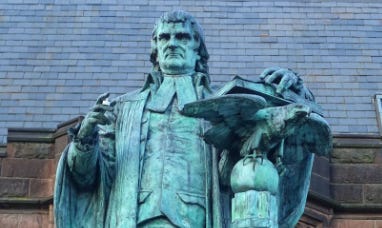The History Erasers Come for John Witherspoon
Princeton's flawed but historically important former president may soon be purged
Many icons of America’s past have more recently become targets for posthumous condemnation and “cancellation,” stemming from their undeniable human flaws or bygone social practices that offend modern sensibilities. Debating whether they’re heroes or villains, or perhaps something in between, often becomes a lopsided affair, since the accused are dead and can’t easily defend their reputations or legacies from beyond the grave. Tearing down statues has become a popular way for contemporary critics to register displeasure and “right” historical wrongs, by (literally) knocking these figures off the pedestals on which we’ve placed them. That’s why the statues have been going away, one by one, even though that denies the rest of us the opportunity to study their lives, put things in context, reflect on the past and possibly even learn lessons from it.
Continental Congress member and early Princeton University President John Witherspoon has now joined the ranks of American greats that some want ousted from the public square, as punishment for the fact that he, like many of his contemporaries, owned slaves. But Witherspoon, when viewed in context and in light of the latest scholarship, may not have been the abject scoundrel that detractors portray, as Princetonians for Free Speech co-founders Stuart Taylor, Jr. and Edward Yingling recently argued in The Nation Review. Indeed, a more nuanced and updated look back argues not just for keeping Witherspoon’s statue, but for recognizing his relatively enlightened views on slavery and his undeniable importance as a patriot, preacher, and successful university president.
Bookmark the Princetonians for Free Speech website and sign up for their excellent newsletter by following this link. Please also follow the group on X (@PrincetoniansFS) and Facebook.



